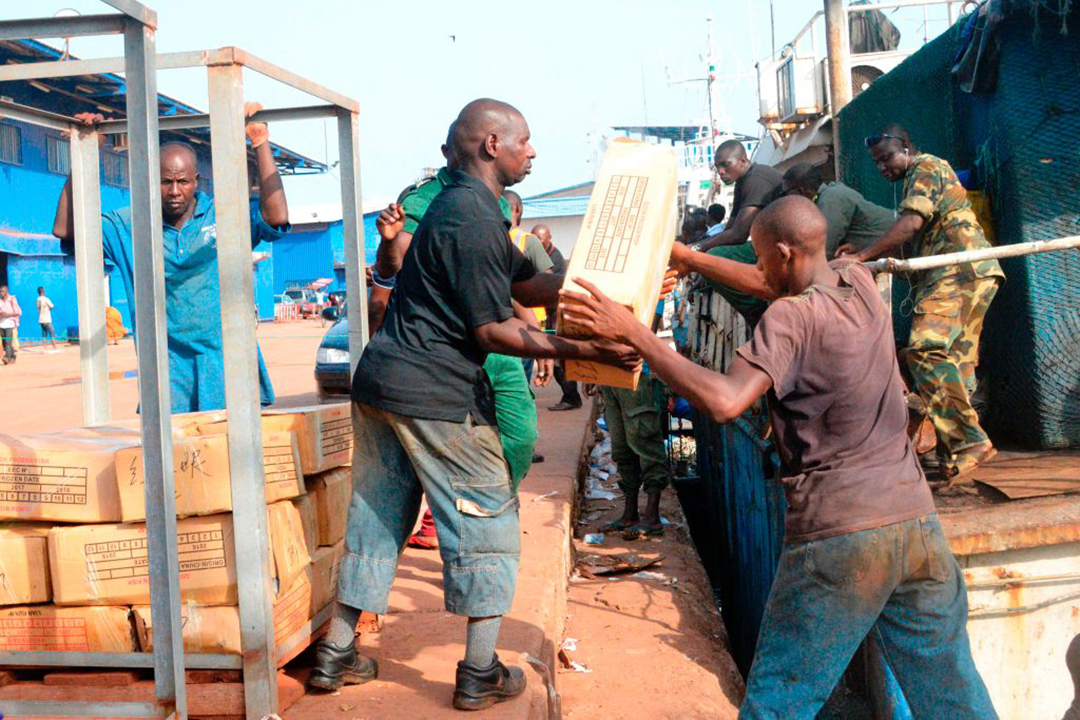New Study Shows Hot Spots for Fishing Vessel Labor Abuses
ADF STAFF
A new study identifies West Africa as one of the world’s most affected regions by labor abuse on vessels involved in illegal, unreported and unregulated (IUU) fishing.
Conducted by the Stanford University Center for Ocean Solutions, the study used anonymous surveys distributed to experts from seafood companies, research institutions and human rights organizations, combined with satellite-based vessel-tracking data curated by Global Fishing Watch, to identify high-risk regions.
The Azores, Argentina, the Falklands Islands and Peru were the other top regions, the study showed.
“Surveillance on the high seas is innately challenging, so these data provide a critical first step in helping stakeholders understand where to look deeper,” lead author Elizabeth Selig, deputy director of the Stanford Center for Ocean Solutions, said on the university’s website. “We hope these findings can help to inform strategically expanded enforcement, focus development aid investments and increase traceability, ultimately lowering the chance that seafood associated with labor abuse or illegal fishing makes its way to market.”
The study found that governments with poor control of corruption and Chinese vessels in their waters were most at risk for labor abuse related to IUU fishing.
Worldwide Governance Indicators defined poor control of corruption as the “extent to which public power is exercised for private gain, including both petty and grand forms of corruption, as well as ‘capture’ of the state by elites and private interests” and “the extent to which public power is exercised for private gain.”
China commands the world’s largest distant-water fishing fleet and has targeted West Africa for decades. It is the world’s worst illegal fishing offender, according to the IUU Fishing Index. China uses an array of illegal fishing tactics, such as flying a “flag of convenience,” which means a company pays for its vessels to fly a particular country’s flag, although the beneficial owner is located elsewhere.
Chinese vessels also are known to use illegal gear, fish in protected waters, ram much smaller artisanal fishing boats at sea and mistreat African crew members.
Ghanaian and Kenyan fishermen who work aboard Chinese vessels have publicly discussed mistreatment at the hands of a ship’s captain and crew. They often work long hours in deplorable conditions, are deprived of water and medicine, are routinely threatened with violence, and are forced to stay onboard after their contracts have expired while not earning additional pay.
The Stanford study found that vessels that stay in ports for shorter durations are more likely to engage in labor abuse. The shorter a port stay, the less time port authorities have to intervene or for workers to access port services.
“Ports are one of the few places to identify and respond to labor abuse,” Jessica Sparks, a fellow at the Stanford Center for Ocean Solutions and associate director at the University of Nottingham Rights Lab, said on the university’s website. “We need to ensure that policies and practices allow fishers to access trusted actors and services at port so they can safely report on their condition.”
The Stanford study found that after the Port State Measures Agreement (PSMA) was established in 2016, fewer vessels deemed an IUU fishing risk visited ports in countries that ratified the agreement. The PSMA dictates inspection standards, data exchange and port entry or denial for foreign-flagged trawlers.
Of the 70 nations that have ratified the PSMA, 24 are in Africa.
“Port state measures offer a lot of promise, but they need to be implemented effectively and, ideally comprehensively across regions, so that vessels cannot easily escape scrutiny by going to a port in a neighboring country,” Selig said on the university’s website. “We need regional ratification and effective implementation.”


Comments are closed.